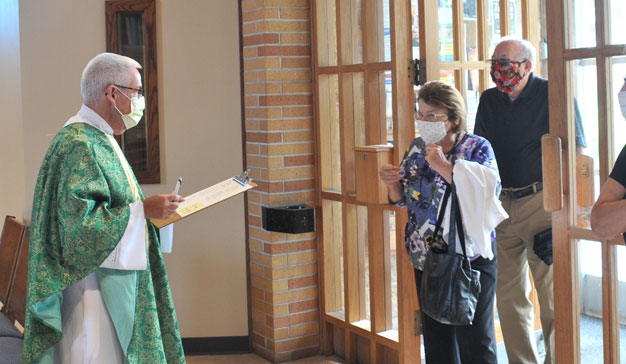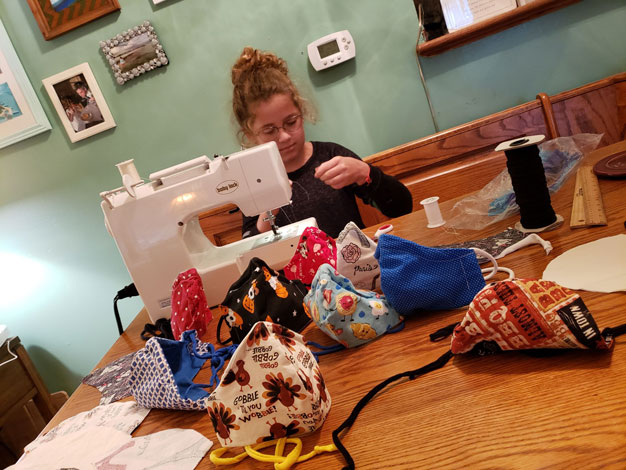By Kathy Kuhl
For The Catholic Messenger
Four months later than she expected to, Ella Houseman made her first Communion with two other children on Sept. 13 at Ss. Mary & Mathias Parish in Muscatine.
In a post-first Communion glow, masked and veiled, she said having more time to learn what she needed made her feel “kinda relieved…. I was nervous about it,” she said. Her mother, Stephanie Houseman, pointed out that Ella hit a turning point this summer. Ella nodded, saying, “I was anxious to go now.”

Ella Houseman made her first Communion Sept. 13 at Ss. Mary & Mathias Parish in Muscatine.
Late summer and early fall are not typically the time of year for youths to receive their first Communion or the sacrament of confirmation, but as with so many events, COVID-19 caused a delay. Now that most parishes have at least partly reopened, many are celebrating the sacraments of initiation a few parishioners at a time. This keeps parishioners safe by reducing the numbers gathered and the time spent congregating.
Sister Cheryl Demmer, PBVM, is director of religious education for both Ss. Mary & Mathias, Muscatine, and St. Mary Parish-Wilton. She said six children celebrated their first Communion Sept. 27 at St. Mary and 35 children celebrated their first Communion at separate Masses throughout September at Ss. Mary & Mathias.
“The families signed up in advance, and I let the parish office know by the Thursday before,” she said, noting that the parish is seating in every third pew to keep parishioners socially distanced.
The shift in celebration dates meant the first Communicants needed to review what they had learned in the months beforehand. “They and the parents had Formed.org assignments, and I sent some written materials, also,” she said. “We had to have parents review with them how to receive Communion with a mask,” she noted.
Sister Cheryl said the confirmation candidates and Rite of Christian Initiation of Adults (RCIA) candidates had similar refresher information to study. The 45 confirmation candidates for Ss. Mary & Mathias will celebrate the sacrament over a period of three Wednesdays in October — 7, 14 and 28. “These celebrations will include the adults — the RCIA (candidates) who need to be confirmed.” The Wilton parish celebrates confirmation every two years, so its six candidates anticipate confirmation in 2021.
Sister Cheryl said the celebration of the sacraments of initiation with the RCIA participants is more complicated, “so we will celebrate one family at a time. One family has a lot more members coming in from out of state.”
At Our Lady of Lourdes Parish in Bettendorf, first Communion celebrations were scheduled for April 20 and 21. Instead, the 28 first Communicants celebrated over eight Masses between July 25 and Aug. 2. Emily Andes, the parish’s director of faith formation, said she made sure to communicate in advance the diocesan and parish guidelines for families with children receiving their first Communion.
“Well-trained hospitality ministers and reserved pews were also key in helping our community worship together safely, especially at these milestone celebrations when we have extended family and friends visiting our Masses,” Andes said. “We also have a team of volunteers who helped us to livestream the celebrations so that family members can participate.”
Our Lady of Lourdes first scheduled confirmation for May 9, but because of the pandemic, the candidates received the sacrament Aug. 29, 30 or Sept. 13. Brett Adams, the parish’s coordinator of youth evangelization and youth ministry, said choosing new dates required several considerations.
“We were trying to strike a balance between the urgency to complete the candidates’ initiation and waiting long enough to be able to celebrate (with) our congregation, recognizing the communal aspect of the sacrament,” he said.
With 24 candidates and multiple Mass options, the parish kept its numbers to a reasonable level for each celebration. Adams said the seating arrangement was thoroughly thought out, with candidate/sponsor pairs one per pew, and the next pair at the opposite end of the next pew. To keep people from having to cross in front of each other, celebrant Father Jason Crossen, pastor of Our Lady of Lourdes, moved to them.
Adams held a mini-retreat with the confirmation candidates on Aug. 23 via Zoom video conference. He revisited the meaning of the sacrament, assessed the candidates’ feelings and expectations, and encouraged them to think about how they will continue to grow in faith after receiving the sacrament.
At Sacred Heart Church in Melcher-Dallas, the original date for first Communion was May 3 but rescheduled to June 28. The parish planned to celebrate confirmation April 26 but moved the date to July 12, said Shari Schneider, director of religious education. Three children received their first reconciliation and first Communion, and eight were confirmed.
“We were about done with faith formation for 2019-20 when the church closed down because of COVID-19,” she said, noting that for their smaller celebrations of the sacraments of initiation, the parish practiced diocesan guidelines to guard against transmission of the virus. She is now focusing on how the 2020-21 faith formation year needs to be different to keep everyone safe and healthy.
“When we start on Sept. 20, I am dividing the kids into two groups alternating every other Sunday,” she said. “This keeps the number of kids down so they are able to social distance and we can keep areas clean and maintained.”
She said on the alternating Sundays, students will have paper packets and workbooks that go home to be completed and returned.
Making these changes is a team effort, Schneider said.
“I have a good group of teachers and a lot of support at Sacred Heart.” she said.








